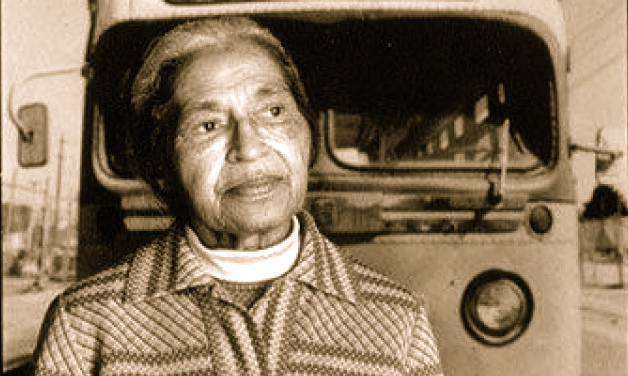Rosa Parks

On Rosa Parks’ 100th Birthday, Recalling Her Rebellious Life Before and After the Montgomery Bus
 Born on Feb. 4, 1913, today would have been Rosa Parks’ 100th birthday. On Dec. 1, 1955, Parks refused to give up her seat to a white passenger on a city bus in Montgomery, Alabama. Her act of resistance led to a 13-month boycott of the Montgomery bus system that would help spark the civil rights movement. Today we spend the hour looking at Rosa Parks’ life with historian Jeanne Theoharis, author of the new book, “The Rebellious Life of Mrs. Rosa Parks.” Often described as a tired seamstress, no troublemaker, Parks was in fact a dedicated civil rights activist involved with the movement long before and after her historic action on the Montgomery bus. “Here we have, in many ways, one of the most famous Americans of the 20th century, and yet treated just like a sort of children’s book hero,” Theoharis says. “We diminish her legacy by making it about a single day, a single act, as opposed to the rich and lifelong history of resistance that was actually who Rosa Parks was.” We also air audio of Rosa Parks in her own words. In the midst of the boycott in April of 1956, she spoke to Pacifica Radio about the action she took. [includes rush transcript]
Born on Feb. 4, 1913, today would have been Rosa Parks’ 100th birthday. On Dec. 1, 1955, Parks refused to give up her seat to a white passenger on a city bus in Montgomery, Alabama. Her act of resistance led to a 13-month boycott of the Montgomery bus system that would help spark the civil rights movement. Today we spend the hour looking at Rosa Parks’ life with historian Jeanne Theoharis, author of the new book, “The Rebellious Life of Mrs. Rosa Parks.” Often described as a tired seamstress, no troublemaker, Parks was in fact a dedicated civil rights activist involved with the movement long before and after her historic action on the Montgomery bus. “Here we have, in many ways, one of the most famous Americans of the 20th century, and yet treated just like a sort of children’s book hero,” Theoharis says. “We diminish her legacy by making it about a single day, a single act, as opposed to the rich and lifelong history of resistance that was actually who Rosa Parks was.” We also air audio of Rosa Parks in her own words. In the midst of the boycott in April of 1956, she spoke to Pacifica Radio about the action she took. [includes rush transcript]
TRANSCRIPT
This is a rush transcript. Copy may not be in its final form.
AMY GOODMAN: A hundred years ago today, civil rights pioneer Rosa Parks was born. It was February 4th, 1913. On December 1st, 1955, when she was 42 years old, she refused to give up her seat to a white man on a city bus in Montgomery, Alabama. She was arrested, convicted of violating the state’s segregation laws. Her act of resistance led to a 13-month boycott of the Montgomery bus system that would help spark the modern-day civil rights movement and launch Dr. Martin Luther King Jr.
We want to go to a clip of Rosa Parks, in her own words. In the midst of the boycott, April 1956, she spoke to Pacifica Radio about the action she took.
ROSA PARKS: I left work on my way home, December 1st, 1955, about 6:00 in the afternoon. I boarded the bus downtown Montgomery on Court Square. As the bus proceeded out of town on the third stop, the white passengers had filled the front of the bus. When I got on the bus, the rear was filled with colored passengers, and they were beginning to stand. The seat I occupied was the first of the seats where the Negro passengers take as they—on this route. The driver noted that the front of the bus was filled with white passengers, and there would be two or three men standing. He looked back and asked that the seat where I had taken, along with three other persons: one in a seat with me and two across the aisle were seated. He demanded the seats that we were occupying. The other passengers there reluctantly gave up their seats. But I refused to do so.
I want to make very certain that it is understood that I had not taken a seat in the white section, as has been reported in many cases. An article came out in the newspaper on Friday morning about the Negro woman overlooked segregation. She was seated in the front seat, the white section of the bus and refused to take a seat in the rear of the bus. That was the first newspaper account. The seat where I occupied, we were in the custom of taking this seat on the way home, even though at times on this same bus route, we occupied the same seat with whites standing, if their space had been taken up, the seats had been taken up. I was very much surprised that the driver at this point demanded that I remove myself from the seat.
The driver said that if I refused to leave the seat, he would have to call the police. And I told him, “Just call the police.” He then called the officers of the law. They came and placed me under arrest, violation of the segregation law of the city and state of Alabama in transportation. I didn’t think I was violating any. I felt that I was not being treated right, and that I had a right to retain the seat that I had taken as a passenger on the bus. The time had just come when I had been pushed as far as I could stand to be pushed, I suppose. They placed me under arrest.
http://www.democracynow.org/2013/2/4/on_rosa_parks_100th_birthday_recalling

